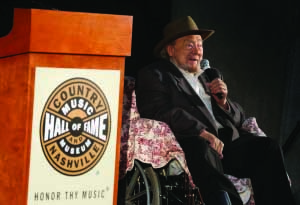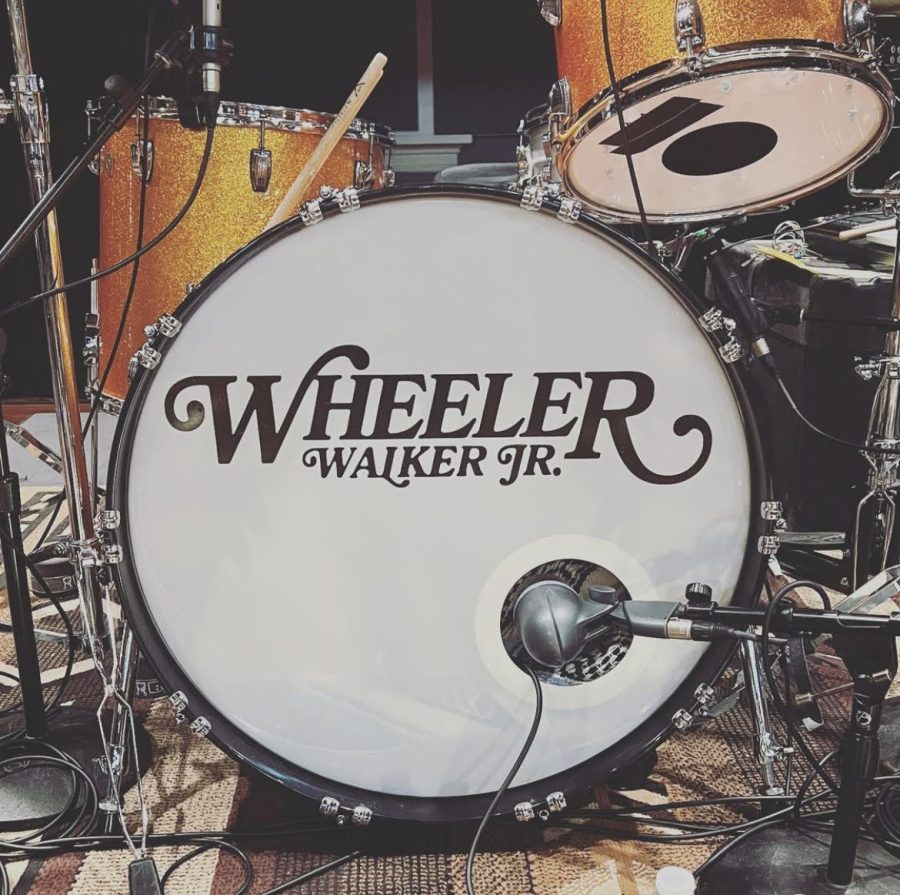Mac Wiseman; Recording History

(Photo provided by Wiseman’s manager)
Mac Wiseman is an American Treasure, Bluegrass pioneer, and Country Music Hall of Famer, and he is now releasing an album that is transcending in the way of folk music. Songs From My Mother’s Hand is very telling for Wiseman, and exactly what the title suggests.
While he was growing up, his mother kept several composition books in which she wrote the lyrics of folk songs broadcasted over their radio by kerosene light at their kitchen table in Va.
From the time Wiseman received these notebooks, he treasured them, waiting until he was 89 to take them into a recording studio to turn them into a Hall of Fame-worthy album, bridging the generational gap that has formed in the evolution of country music while simultaneously sharing his mother’s short-hand with the world.
I was fortunate enough to speak with Thomm Jutz of Wrinkled Records, who produced this amazingly unique album, about the experience as a whole.
When I heard that Wrinkled first received word of the project, I felt as though there had been a resounding “yes, please,” regarding the company taking on Wiseman’s endeavor. I asked Jutz what brought this unanimous response about and if he could the cite of the inspiration that brought it all to life.
“Both, in equal measure,” he responded. “It’s really an incredible package that was handed to us and Wrinkled by Mac. He’s kept these books for all these years. Content, artwork, musical direction, all of it fell into place because of these books, and because of Mac’s history as one of America’s most important singers.”
It is ironic that Wiseman, at this point in vast musical career, is bringing everything full circle by sharing the influence of music that fostered his life at such a young age. I believe that if this album had been completed earlier in Wiseman’s career, however, it would not have been so successful, because the weathered-warmth his voice aids to each track is something that only time and life can produce.
I wondered if it had been difficult to stay authentic to the original sound of the songs, or if Wiseman’s institutional knowledge about American Roots music was all that was needed to keep this album true to its 1930’s sound.
“Peter Cooper [co-producer] and I are both keenly interested in [Southern] music from this era,” Jutz revealed. “So between Mac, us and the players we chose, we were confident that we’d represent these songs adequately without trying to sound retro.”
Which is exactly what they did. This album appeals not only to those who favor American Roots music and its history, but also those who enjoy learning where the music they love today originated from. What better way to learn the origin than from the handwriting of a woman who single-handedly documented it as it unfolded?
It is hard not to wonder if the process became emotional at times for the engineers, producers and musicians involved, because of how different the concept was and how connected Wiseman was the content he was performing.
“Yes,” Jutz revealed when I inquired about just that. “Hearing an 89-year-old master of American music singing with a 23-year-old acoustic music star Sierra Hull would make anybody with an appreciation for this kind of music emotional.”
If anyone could make an album as timeless as this a success in today’s industry, it is Wiseman with his already large and loyal fan base, from Nashville and beyond.
“So far the reactions from the Nashville community has been incredible,” Jutz said. “We are still talking to the hall of Fame about how to best collaborate on this.”
I inquired if it was a difficult process to find the musical origin of the songs that were lyrically provided by Wiseman’s mother, and how true to the instrumentation they were able to stay for the album.
“Not really. Mac remembered all of these melodies very well,” Jutz answered. “As far as instrumentation there’s really no rule book. We simply didn’t want to use any instruments that wouldn’t have existed back then, therefore it’s all acoustic, no drums, and no artificial sounds of any kind.”
The authenticity of the project is apparent, and it’s hard to appreciate the immense technique it must’ve taken to, as Jutz alluded to, keep the album from sounding falsely retro.
“I would say that anybody who’s interested in Folk music, Bluegrass, Roots music in general should hear this record,” Jutz said when I asked who the real target audience they favored when fostering this album.
It is easy to see that Wiseman’s warm and compassionate connection to this music is the reason that songs from the early 1930’s, a time when composition books and kerosene lights were the entertainment on Tue nights, are now reaching the hearts of those in a generation where the world never turns off and winds down. There is also something about the simplicity of it all that makes the listener feel as if they are disconnected from the bustle of today.
“I think these songs take us back to a time that’s often romanticized,” Jutz agreed. “Those were hard times in rural Va, yet they were also simpler times, and I think that’s what attracts us to these songs. A lot of folks are on overload from all the overproduced and virtually created music and want to hear music played by human beings again,” he continued.
In a world full of stress, high standards, and false pretenses, where sounds originated from a computer are considered music, saxophonists take a back seat in the corner bars of America to the doctored sounds of music today. We live in a world that we can’t turn off and Song’s From My Mother’s Hand forces listeners to do just that.










